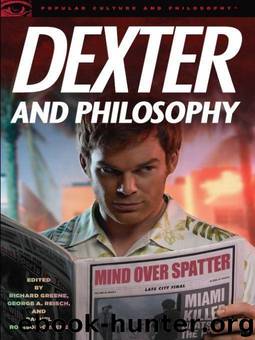Dexter and Philosophy by Greene Richard; Reisch George A.; Robison Rachel

Author:Greene, Richard; Reisch, George A.; Robison, Rachel [Greene, Richard; Reisch, George A.; Robison, Rachel]
Language: ru
Format: mobi
ISBN: 9780812697261
Publisher: Perseus Books Group
Published: 2011-04-12T04:00:00+00:00
Better You than Me, Dex!
But there’s more involved in Dexter’s decisions to kill than just his constitution—he also has to have the opportunity to kill. Put Dexter on an uninhabited desert island before he gets the chance to kill anyone and he might just live a life of perfect virtue. Miami, however, provides Dexter with plenty of opportunities—even with his commitment to follow the Code of Harry. This points us to situational luck: that we are not always responsible for the kinds of decisions we are asked to make. Suppose someone close to you has committed a crime and you find out about it. You now face a moral decision: do you turn this person in or not? The point is that you did not choose to be in this situation, but you will be held responsible for whatever you do in it, whether good or bad.
The obvious parallel to this scenario would be when and if Debra discovers Dexter’s unusual hobby. As that hasn’t happened yet, let’s turn to a couple of situations Dexter finds himself in where he has to make a choice, but he didn’t choose the situation itself. To make things simpler, we’ll focus on two situations where Dexter has to choose between two people: one innocent, the other a killer.
In the first situation, at the end of the first season, Dexter has to choose between the lives of his long lost brother and his adoptive sister. Dexter did not choose to be in the situation—given his druthers Dexter would have preferred to have both of them in his life in some capacity. He wants to keep Brian so that he can have someone with whom to share his Dark Passenger, but he needs Deb to maintain whatever link he has to the rest of humanity. In the end, of course, Dexter makes the “right” choice—he saves Debra and kills Brian. But the choice was difficult, as any interesting moral choice is going to be. The choice also helps the show. We see Dexter at the end of the first season as a monster, but he’s our monster. That’s why the discovery of his dumping ground causes us discomfort. We know he’s a monster, we know he should be stopped, but we also know that even in the face of tremendous temptation, Dexter will follow the Code of Harry, which means he’s only dangerous to killers.
At least, that’s the theory. The closing episodes of the second season show that Dexter’s threat isn’t quite so clear cut. Once again Dexter has to choose between an innocent person and a killer. But this time the case is complicated because the killer is Dexter himself. As Agent Lundy and the Bay Harbor Butcher Task Force close in, Dexter finds himself forced to kidnap Detective Sergeant Doakes. The interesting decision occurs later, when the task force begins to focus on Doakes as a suspect, and Dexter begins contemplating turning himself in. He can’t kill Doakes—that’s against the Code. At the
Download
This site does not store any files on its server. We only index and link to content provided by other sites. Please contact the content providers to delete copyright contents if any and email us, we'll remove relevant links or contents immediately.
| Espionage | Hoaxes & Deceptions |
| Murder & Mayhem | Organized Crime |
| Serial Killers | White Collar Crime |
Mindhunter: Inside the FBI's Elite Serial Crime Unit by John E. Douglas & Mark Olshaker(8699)
Wiseguy by Nicholas Pileggi(5313)
Hitman by Howie Carr(4822)
Room 212 by Kate Stewart(4731)
Secrecy World by Jake Bernstein(4387)
Killers of the Flower Moon: The Osage Murders and the Birth of the FBI by David Grann(4186)
Breaking Free by Rachel Jeffs(4009)
Papillon (English) by Henri Charrière(3901)
Killers of the Flower Moon by David Grann(3748)
Say Nothing by Patrick Radden Keefe(3725)
American Kingpin by Nick Bilton(3504)
The Secret Barrister by The Secret Barrister(3419)
Molly's Game: From Hollywood's Elite to Wall Street's Billionaire Boys Club, My High-Stakes Adventure in the World of Underground Poker by Molly Bloom(3331)
Mysteries by Colin Wilson(3248)
In Cold Blood by Truman Capote(3134)
I'll Be Gone in the Dark by Michelle McNamara(2888)
Signature in the Cell: DNA and the Evidence for Intelligent Design by Stephen C. Meyer(2875)
Rogue Trader by Leeson Nick(2823)
Bunk by Kevin Young(2808)
